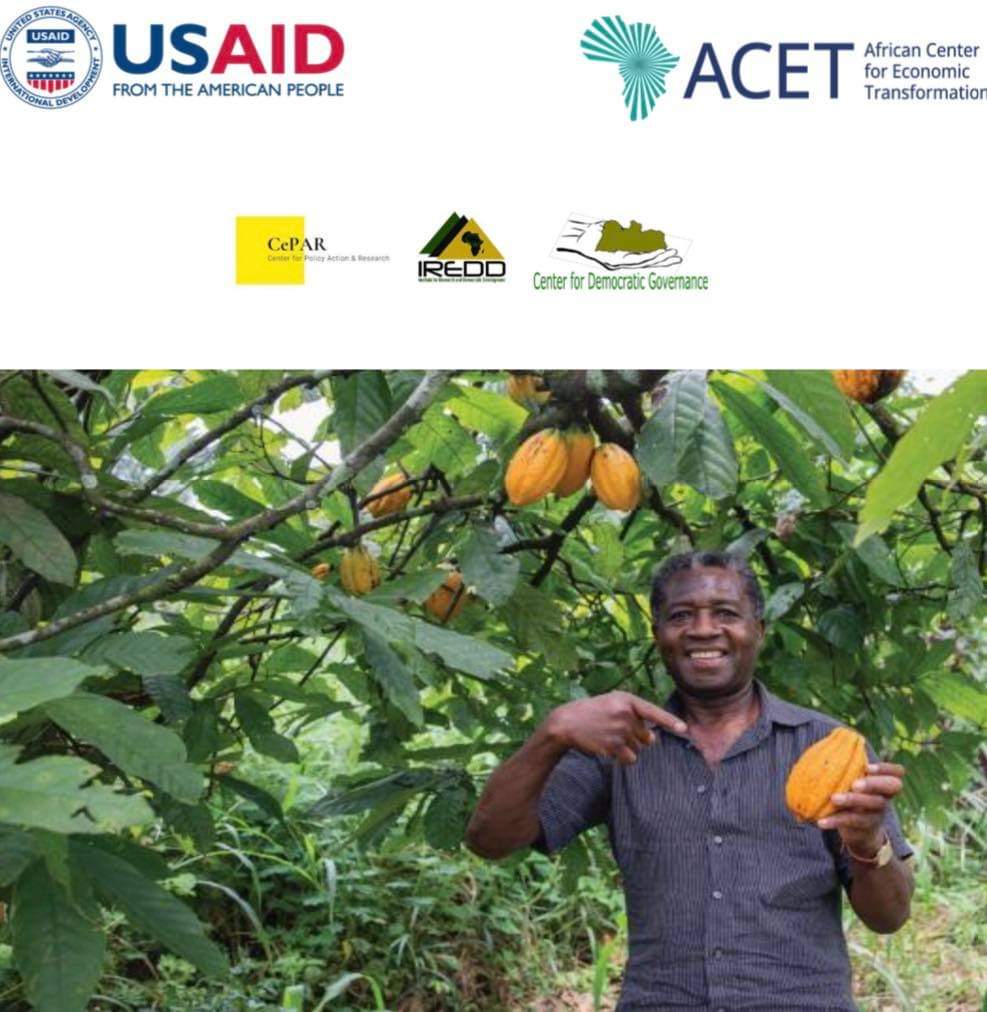For Ultimate Artisanal Chocolate Manufacturing in Liberia…
CSOS, PARTNERS RALLY GOVERNMENT’S INTERVENTION

By: Lisa T. Diasay
Accra, Ghana: Despite its rich geographical location and abundant natural wealth, Liberia still faces economic challenges that hinder the growth of the agriculture sector especially, cocoa.
This nightmare has pushed stakeholders both local and International including farmers to raise their voices to the government about the change in the paradigm shift of the sector.
As part of this, the African Center for Economic Transformation (ACET) in partnership with the Institute for Research and Democratic Development (IREDD), Center for Policy Action and Research (CEPAR), and Center for Democratic Governance (CDG) recently concluded a one-day virtual dialogue to explore policy options for artisanal chocolate manufacturing in Liberia, as well as links to regional and global markets and accompanying certifications.
The meeting also focused on exploring the development of an innovation platform based on the Triple Helix partnership to support the artisanal chocolate value chain.
With Support from USAID, the Liberia Economic Policy Dialogue (LEPDA) goal is to strengthen the policy-making capacity of the Liberian government and facilitate the design and implementation of specific reforms to promote private sector-led, broad-based economic growth and development.
During the meeting, panelists and experts from across Africa recommended tentative cooperation between local investors, the government’s involvement through tax incentives for local companies, as well as a ban on the importation of chocolate products, as possible remedies to a vibrant chocolate value chain in Liberia.
Serving as one of the panelists, the Chief Executive Officer and Founder of Afroco Construction Limited, Priscilla Impraim, said if a country wants to venture into Cocoa processing, it’s the government needs to remain resolute and ensure that chocolate imports are banned; stressing that such decision will help increase the consumption of chocolate on the local market.
She said foreign companies import finished chocolate at a very high cost, and as such; she believes if anything has to happen, it has to happen from the government, specifically with a decision to control suppressions on local producers and support through tax waiver, skill set, and other necessary means in order to ensure that Africans are at the same level with international companies.
Also Speaking, an Influential Business Personality in the Cocoa sector, Jeroen Van Wijk, emphasized the need for cooperation with buyers that know the preferences and the standards of the market. He said exporting food products to Europe and North America is challenging, as such; Liberia as a country with plans to expand its cocoa export, local companies should consider the need for partnership with other potential investors, which will give a broader understanding of the market environment in the said region as well as the demands of the consumers.
On the other hand, some stakeholders at the LEPDA dialogue disagreed with Priscilla’s suggestion to have a ban placed on the importation of chocolate, noting that it is not a genuine remedy to the challenges confronting the market.
They however concurred with her recommendation about the national government’s involvement in supporting local companies to strengthen the cocoa sector through exports, instead of placing a band on the importation of a specific product without a complementary mechanism.
The CSOs want the Liberian government to give more support to the sector through the Liberia Agriculture Commodity Regulatory Authority (LACRA) to ensure support for the cocoa sector in the country. This, they noted, will lead to the production of chocolate for export within Africa and even to the global stage.
However, Liberia’s chocolate consumption (import) rate was at the value of 2 million dollars in 2020, as such, many believe that there is a critical need for more engagement in the production of chocolates in Liberia.
According to the Cocoa Barometer, the segment with the biggest share of value contributed to the cocoa value chain is chocolate production, with the retail sector capturing the most value (44.2%), closely followed by chocolate manufacturing (35.2%), grinding(7.6%), farmers (6.6%), taxes or marketing boards(4.3%), and logistics(2.1%). According to StatistaDigital Market Outlook, the chocolate confectionery market generated a revenue of approximately USD 0.98 trillion worldwide in 2021, and they estimate that the generated revenue in this market is expected to increase in the coming years to a predicted value of USD 1.12 trillion in 2027. Ultimately, chocolate production captures the most value.
To compete in high-quality niche products, brands and products must be unique and distinguish themselves from other niche products. This calls for expertise in marketing and developing needed linkages to the artisanal chocolate value chains.
Ultimately, artisanal chocolate manufacturers in Liberia will require greater direct assistance from the government, academia, and the private sector in order to capitalize on prospects in local, regional, and global markets.
The LEPDA is a four-year technical assistance, capacity development, and grants project that aims to foster self-reliance by spurring private sector-led economic expansion in Liberia. The project seeks among other things to increase citizens’ participation and advocacy in the policy-making arena by strengthening CSOs’ capacity to conduct robust policy analysis and become effective partners in the policymaking process.
The African Center for Economic Transformation (ACET) is a pan-African economic policy institute that supports governments and businesses to transform economies and deliver sustainable growth that improves livelihoods. ACET follows a unique approach that combines analysis, advice, and advocacy in critical program areas, encompassing regional integration, economic management and governance, youth employment and skills, gender equality, private sector development, digital and innovation, climate, and agriculture to foster collaboration among policymakers and the private sector as they look to accelerate Africa’s transformation.



